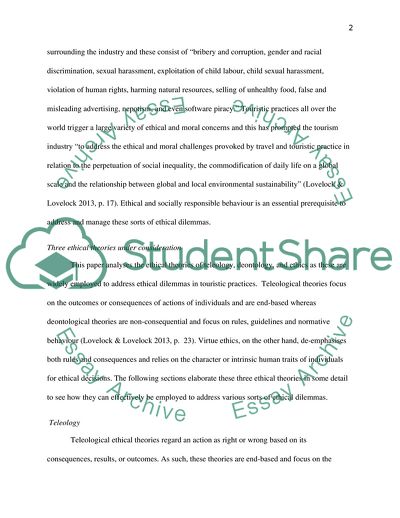Cite this document
(Ethical Dilemmas and Theories in Hospitality and Tourism Industry Term Paper Example | Topics and Well Written Essays - 2000 words, n.d.)
Ethical Dilemmas and Theories in Hospitality and Tourism Industry Term Paper Example | Topics and Well Written Essays - 2000 words. https://studentshare.org/ethics/1846409-with-the-use-of-practical-examples-identify-the-key-factors-that-make-the-tourism-and-hospitality-industry-particularly-sensitive-to-ethical-dilemmas-and-critically-review-three-main-ethics-theories-that-could-be-used-in-addressing-these-dilemmas
Ethical Dilemmas and Theories in Hospitality and Tourism Industry Term Paper Example | Topics and Well Written Essays - 2000 words. https://studentshare.org/ethics/1846409-with-the-use-of-practical-examples-identify-the-key-factors-that-make-the-tourism-and-hospitality-industry-particularly-sensitive-to-ethical-dilemmas-and-critically-review-three-main-ethics-theories-that-could-be-used-in-addressing-these-dilemmas
(Ethical Dilemmas and Theories in Hospitality and Tourism Industry Term Paper Example | Topics and Well Written Essays - 2000 Words)
Ethical Dilemmas and Theories in Hospitality and Tourism Industry Term Paper Example | Topics and Well Written Essays - 2000 Words. https://studentshare.org/ethics/1846409-with-the-use-of-practical-examples-identify-the-key-factors-that-make-the-tourism-and-hospitality-industry-particularly-sensitive-to-ethical-dilemmas-and-critically-review-three-main-ethics-theories-that-could-be-used-in-addressing-these-dilemmas.
Ethical Dilemmas and Theories in Hospitality and Tourism Industry Term Paper Example | Topics and Well Written Essays - 2000 Words. https://studentshare.org/ethics/1846409-with-the-use-of-practical-examples-identify-the-key-factors-that-make-the-tourism-and-hospitality-industry-particularly-sensitive-to-ethical-dilemmas-and-critically-review-three-main-ethics-theories-that-could-be-used-in-addressing-these-dilemmas.
“Ethical Dilemmas and Theories in Hospitality and Tourism Industry Term Paper Example | Topics and Well Written Essays - 2000 Words”. https://studentshare.org/ethics/1846409-with-the-use-of-practical-examples-identify-the-key-factors-that-make-the-tourism-and-hospitality-industry-particularly-sensitive-to-ethical-dilemmas-and-critically-review-three-main-ethics-theories-that-could-be-used-in-addressing-these-dilemmas.


